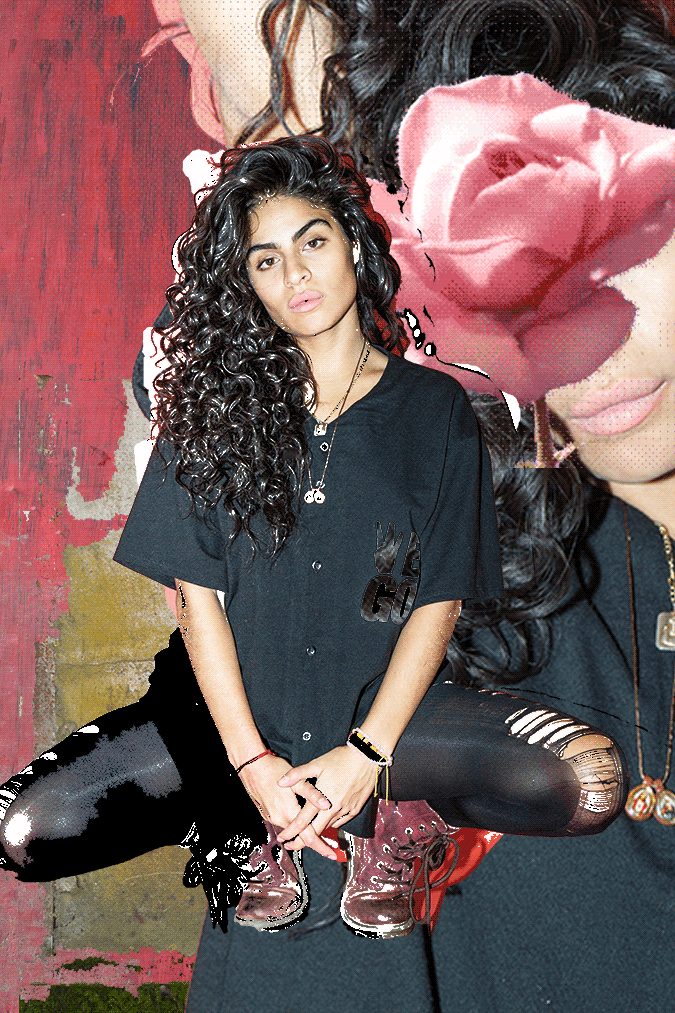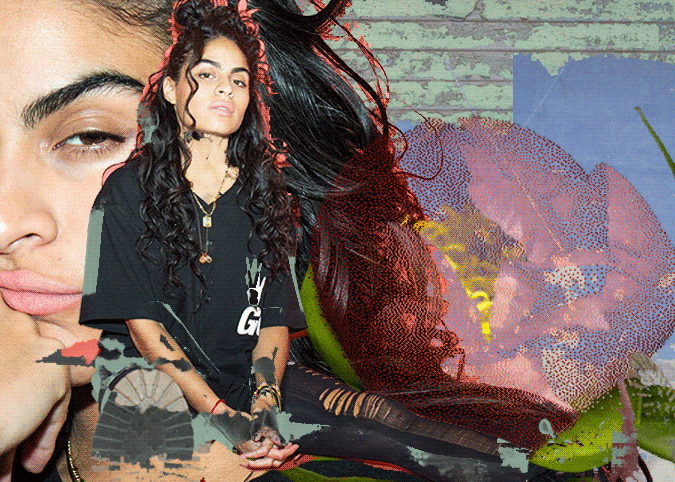It’s the middle of a whirlwind day for Jessie Reyez, like any other star on the cusp of breaking out: hair, makeup, photo shoot, interview, photo shoot, rehearsal for her sold-out show in New York City. But the chaos hasn’t slowed her spirit; she’s bubbly and glowing, beaming out of her petite frame. After all, making music is something she’s been in love with since she was a 3-year-old putting on family shows modeled after Luciano Pavarotti and Celia Cruz videos.
“I’m the happiest that I’ve ever been in my entire life,” says the Canadian-born singer grinning from ear to ear inside Remezcla’s Brooklyn office. And to top it off, her debut EP Kiddo has been receiving outstanding reviews from critics and fans alike since its release in late April.

The seven-track project is devastatingly personal, diving into themes of heartache, disillusionment, and anger. It shows another side of Reyez — one different from the sunny person sitting across the table, and there’s a reason for it. “When you’re happy, you don’t want to get that out of you, but when I’m angry, or when I’m sad, I want it out.”
In her words, she’s a “child of extremes.”
Reyez’s truth is reflected in her brutally honest lyrics and soulful croaks and growls, with her potent voice often threatening to spill over. Her most vulnerable tracks emerged during periods of extreme rage or misery as a creative outlet, one that’s significantly better than stuffing your face with a pint of ice cream or binging on cheap liquor to feel numb. For both Jessie and her fans, it’s a form of emotional release.
This creative process is apparent in her single “Figures,” one of her favorites off Kiddo. It was inspired by a cheating ex-boyfriend and a broken relationship, which she describes vividly as a “slow death;” the 26-year-old recalls crying for weeks. The pain eventually culminated into a four-minute melodic “jar of tears,” which she wrote while attending a musician’s writing camp in Sweden. “[The breakup] wasn’t the best experience, but something that changed my life came out of it,” she offers.
“I’m a child of extremes.”
“Figures” was released in 2016, a year before the EP came to life, and to this day, the single is still gaining traction. Most recently, the Colombian-Canadian singer performed the single live at the 2017 BET Awards, opening her up to a stream of new fans, and yes, endless Amy Winehouse comparisons. But it was the minimalism of her BET Awards performance that stood out; the young vocalist exuded intimacy on a massive stage, sitting on a stool with just her guitar for about 7 million viewers (the official numbers aren’t in yet, but last year’s show had 7.2 million viewers). Just like she would in a cozy venue for 200 people.
“I like to make sure that it’s authentic and that it’s raw,” she declares.
That true-to-self artistic philosophy stems from her upbringing in a family-oriented Colombian household in Toronto. Her parents immigrated from Colombia to Canada before she was born, and like many children of Spanish-speaking immigrants, she grew up naturally combining English with Spanish. Because of it, Reyez doesn’t shy away from including Spanish words in her lyrics. And most importantly, she never felt the need to translate Kiddo’s “Colombian King & Queen.” (Her last name “Reyez” or reyes, translates to “kings,” and her mother’s maiden name “Castillo,” translates to “castle.” Boom. Royalty).
The track is a voicemail left by her doting parents on her birthday, delivered in Colombia’s classic cantaito Spanish accent. It’s a stand on her behalf to keep it that way. “I get those every day. Like I could play you one right now,” she says pointing to her phone. “Because my mom will send me them to me twice a day.”

With her tight-knit family’s support, Reyez was able to overcome one of the biggest obstacles that happened early in her career, when she was living with her family in Miami. She shared the haunting experience in her song “Gatekeeper,” which directly confronts sexism and misogyny in the music industry.
In each verse, Reyez becomes the “gatekeeper” — a symbol for an industry insider who takes advantage of fledgling musicians. “Oh I’m the gatekeeper. Spread your legs, open up/ You could be famous/If you come up anywhere else, I’ll erase you,” she sings with harrowing intensity.
When she was confronted by the “gatekeeper” in her own life, she thought about whether or not she wanted to continue making music, because she wasn’t willing to do what she “thought was a prerequisite for women to do to get in.”
“My mother always told me this: ‘Se tiene que tener respeto con el cuerpo. Usted misma se tiene que respetar.’” Ultimately, she found strength in her mother’s advice.
“I won when I picked up the guitar again,” she recalls the moment she decided to focus on the music, and not the naysayers. “I won when I kept chasing.”

Much like the breakup that inspired “Figures,” the “Gatekeeper” experience is another dark life event that turned into a relatable tale for many young women, especially those finding their way through their professional (and male-dominated) careers. “It was just an experience that happened to me that just so happened to resonate with other people,” she shares.
As for her happiness, she says, “I’m human. There’s no way I’m going to be happy forever.” For now, Reyez is holding onto that effervescent feeling for as long as she can.
Jessie Reyez’s Kiddo EP is out now on Island Records. Keep an eye out for her upcoming collaboration with Calvin Harris, set to drop on his album Funk Vol. 1 on June 30.




